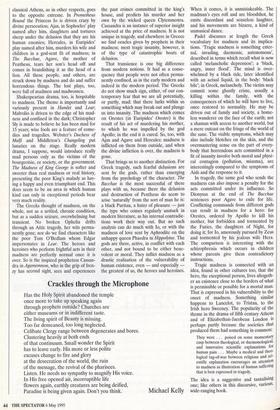Fashions in insanity
Jasper Griffin
WHOM GODS DESTROY: ELEMENTS OF GREEK AND TRAGIC MADNESS by Ruth Padel Princeton University Press, £19.95, £10.95, pp. 276 The thought of suicide, says Nietzsche, gets one through many a difficult night. The thought of madness, rather similarly, is both a terror and also obscurely a comfort to the sane. At least we are not like that; and yet, what would it really be like if one simply let oneself go, or were pushed, over the edge, down into the abyss of irresponsi- bility and unreason? It would be like being dead (and then they'll be sorry!), no longer to be blamed or held responsible for any- thing. And besides, there may be other consolations. Is there not a secret wisdom, a terrible truth, concealed from the hum- drum mind of the sane and accessible only to the madman?
It seems obvious, since the vogue for the writings of Michel Foucault, that the mad are mad in relation, and in response, to a particular society. Styles of madness vary, as do styles of treatment; the serial killers, for instance, who so obsess the media at the moment, are by no means as conspicu- ous in the annals of madness in the past. One obvious source of comparative materi- al is our own society in past centuries, and the treatment of Malvolio in Twelfth Night, or of the lunatics depicted by Hogarth, pro-• vides a disquieting background to our own thoughts and practices (then we locked 'em up; now we chuck 'em out).
Another point of reference, in this as in many areas, is ancient Greece. Ruth Padel, classicist and poet, brings to these dark matters an eye trained also in the ways of contemporary psychoanalytic practice. Her aim is to illuminSe the Greek writers by invoking modern thought, and also to rebuke and extend the narrowness of mod- ern thought by emphasising the evidence of literature, and specifically tragedy. For it is a fact that the earliest Greek writings, the poems of Homer, avoid the theme of madness: too horrid and messy for the world of the Iliad, which is terrible but clear and rational. The tragic theatre of classical Athens, as in other respects, goes to the opposite extreme. In Prometheus Bound the Princess Io is driven crazy by divine persecution; Ajax, in Sophocles' play named after him, slaughters and tortures sheep under the delusion that they are his human enemies; Hercules, in Euripides' play named after him, murders his wife and children in a god-sent fit of madness; in The Bacchae, Agave, the mother of Pentheus, tears her son's head off and comes in brandishing it as the head of a lion. All these people, and others, are struck down by madness and do and suffer horrendous things. The lost plays, too, were full of madmen and madwomen.
Shakespearian drama, too, is hospitable to madness. The theme is importantly and variously present in Hamlet and Lear; Malvolio is driven to the edge of his mad- ness and confined in the dark; Christopher Sly is made to believe he has been mad for 15 years; wise fools are a feature of come- dies and tragedies. Webster's Duchess of Malfi and Middleton's Changeling put lunatics on the stage. Really modern drama, I suppose, would introduce really mad persons only as the victims of the bourgeoisie, or society, or the government. The Madness of King George is softer and sweeter than real madness or real history, presenting the poor King's malady as hav- ing a happy and even triumphant end. This does seem to be an area in which human kind can only in exceptional periods bear very much reality.
The Greeks thought of madness, on the whole, not as a settled, chronic condition, but as a sudden seizure, overwhelming but transient. No broken Ophelia drifts through an Attic tragedy, her wits perma- nently gone; nor do we find characters like the poor Tom O'Bedlam whom Edgar impersonates in Lear. The heroes and heroines who perform frightful acts in their madness are perfectly normal once it is over. So is the inspired prophetess Cassan- dra in Agamemnon, who in the grip of fren- zy has second sight, sees and experiences the past crimes committed in the king's house, and predicts his murder and her own by the wicked queen Clytemnestra. Cassandra is an instance of superior insight achieved at the price of madness. It is not unique in tragedy, and elsewhere in Greece we find oracles given by prophets in their madness; most tragic insanity, however, is of the type of catastrophic bouts of delusion.
That transience is one big difference from modern notions. It had as a conse- quence that people were not often perma- nently confined, as in the early modern and indeed in the modern period. The Greeks do not show much sign, either, of our con- temporary fear that we are all potentially, or partly, mad: that there lurks within us something which may break out and plunge us into insanity. The madness which comes on Orestes (in Euripides' Orestes) is the result of his act of murdering his mother, to which he was impelled by the god Apollo; in the end it is cured. So, too, with Ajax and Agave and Hercules: madness is inflicted on them from outside, and when the divine infliction is over, the madness is gone.
That brings us to another distinction. For Greek tragedy, such fearful delusions are sent by the gods, rather than emerging from the psychology of the character. The Bacchae is the most successful of these plays with us, because there the delusion and destruction of Pentheus do seem to arise 'naturally' from the sort of man he is: a black Puritan, a hater of pleasure — just the type who comes regularly unstuck in modern literature, as his internal contradic- tions work their way out. But no such analysis can do much with Io, or with the madness of love sent by Aphrodite on the unhappy queen Phaedra in Hippolytus. The gods are there, active, in conflict with each other, and not bound to be either bene- volent or moral. They inflict madness as a drastic realisation of the vulnerability of human existence, even — and especially the greatest of us, the heroes and heroines.
Crackles through the Microphone
Has the Holy Spirit abandoned the temple once more to take up speaking again through prophets outside? Churches are either museums or in indifferent taste.
The living spirit of Beauty is missing.
Too far demeaned, too long neglected.
Celibate Clergy range between degenerates and bores.
Clustering heavily at both ends of that continuum. Small wonder the Spirit has to leave early. His more or less polite excuses change to fire and glory at the desecration of the world, the ruin of the message, the revival of the pharisees.
Listen. He needs no sympathy to magnify His voice.
In His free opened air, incorruptible life flowers again, earthly creatures are being deified, Paradise is being given again. Don't you think.
Michael Kelly
When it comes, it is unmistakeable. The madman's eyes roll and are bloodshot, he emits discordant and senseless laughter, and his movements are bizarre, a kind of unmusical dance.
Padel discusses at length the Greek vocabulary for madness and its implica- tions. 'Tragic madness is something exter- nal, invading, daemonic, autonomous', described in terms which recall what is now called 'melancholic depression'; a 'black, angry, inner flood'. The mind is over- whelmed by a black tide, later identified with an actual liquid, in the body: 'black bile'; in Greek, melancholy. The victim may commit some ghastly crime, usually a killing within the family, with the consequences of which he will have to live, once restored to normality. He may be driven out of family and society, a home- less wanderer on the face of the earth; not a shaman with access to another world, but a mere outcast on the fringe of the world of the sane. The visible symptoms, which may also include blotches on the skin, and the overmastering sense on the part of every- body that horrendous acts committed in a fit of insanity involve both moral and physi- cal contagion (pollution, miasma), are interestingly compared to the symptoms of Aids and the response to it.
In tragedy, the same god who sends the madness can also impose a penalty for the acts committed under its influence. So Dionysus at the end of The Bacchae sentences poor Agave to exile for life. Conflicting commands from different gods can result in madness for a hero: for Orestes, ordered by Apollo to kill his mother, but forbidden and tormented by the Furies, the daughters of Night, for doing it; for Io, amorously pursued by Zeus and tormented by his jealous wife Hera. The comparison is interesting with the schizophrenia which occurs in children whose parents give them contradictory instructions.
Tragic madness is connected with an idea, found in other cultures too, that the hero, the exceptional person, lives altogeth- er an existence close to the borders of what is permissible or possible for a mortal man. That is expressed in his vulnerability to the onset of madness. Something similar happens to Lancelot, to Tristan, to the Irish hero Sweeney. The popularity of the theme in the drama of fifth century Athens and of Elizabethan-Jacobean London is perhaps partly because the societies that produced them had something in common: They were . . . poised on some momentary cusp between theological, or daemonological, and innovative scientific explanations for human pain . . . Maybe a medical and theo- logical tug-of-war between religious and sci- entific explanation encourages an attention to madness as illustration of human suffering that is best expressed in tragedy.
The idea is a suggestive and tantalising one; like others in this discursive, various, wide-ranging book.



































































 Previous page
Previous page